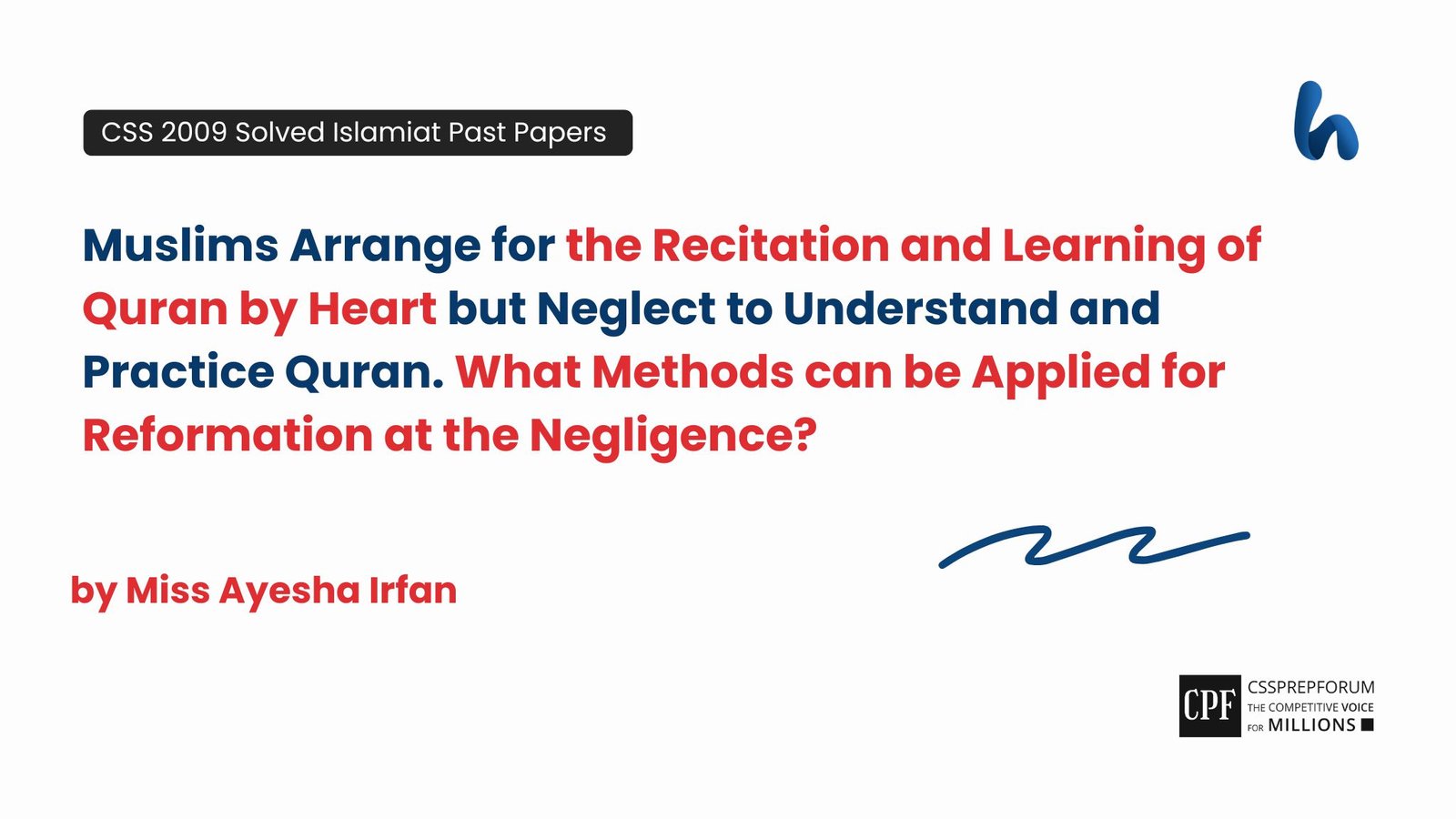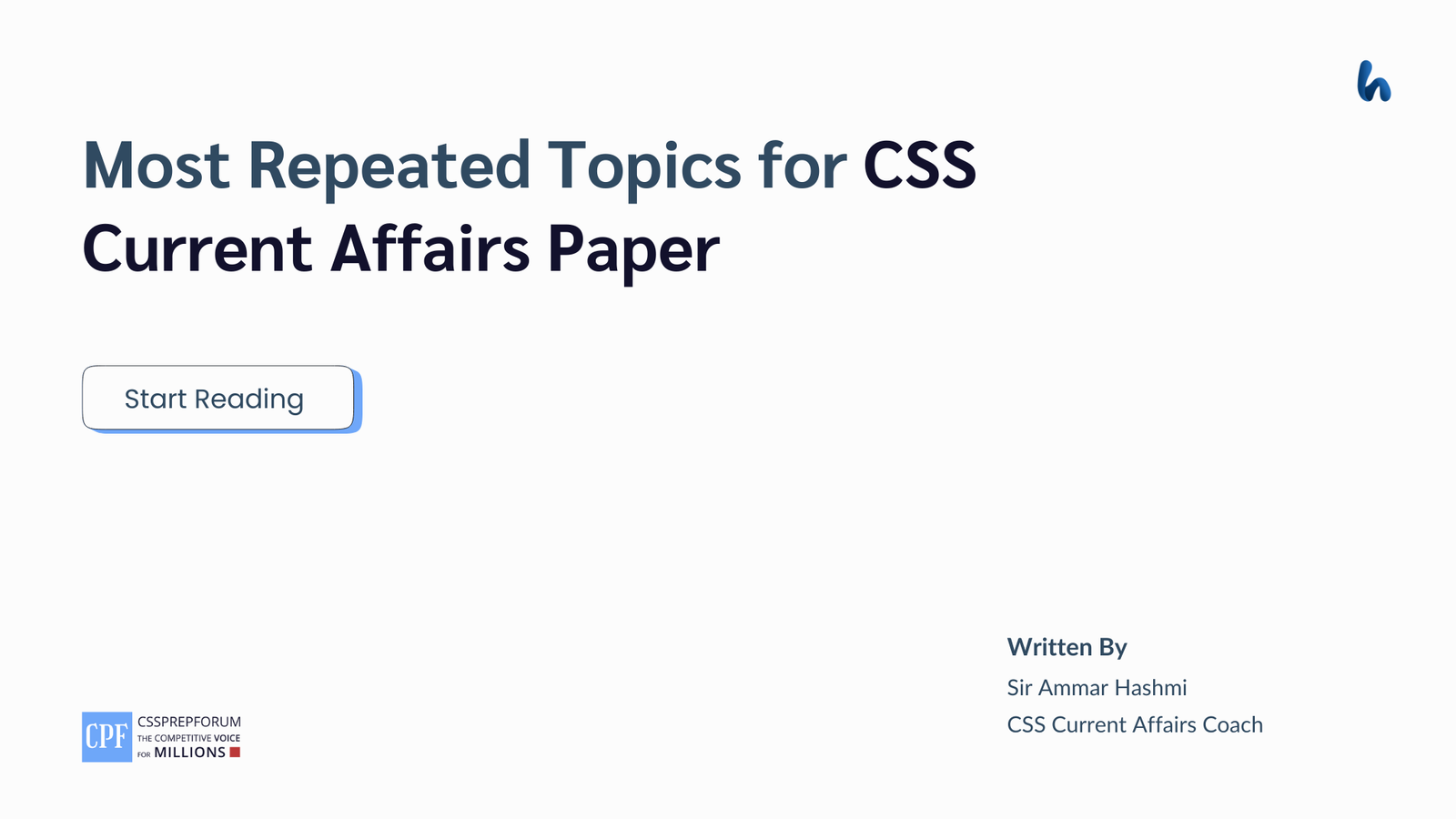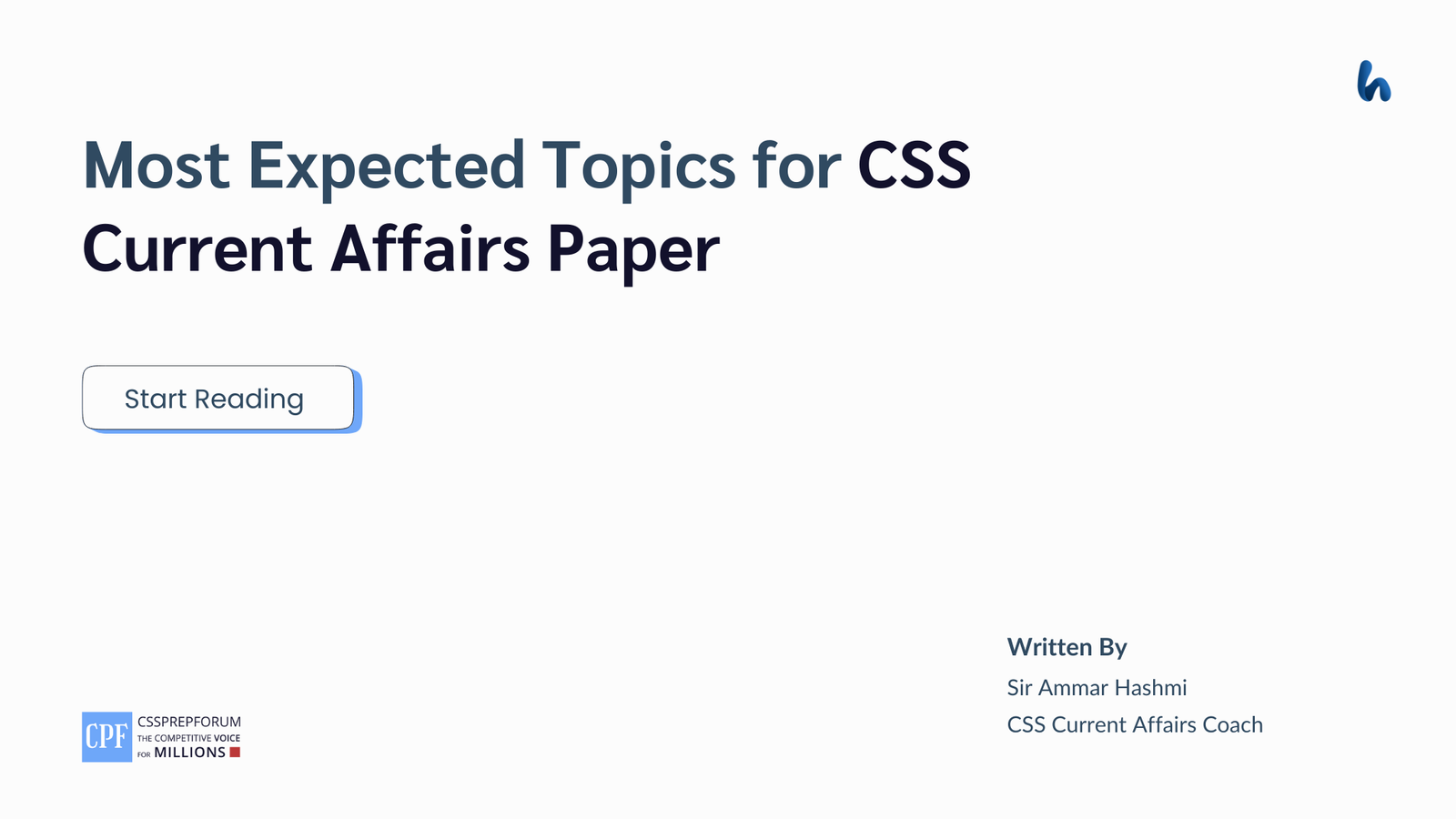CSS 2019 Solved Essay | Classrooms Decide the Future of the Nations
Assistant Director (Pak Govt.) Ihtesham Hussain Khan, a student of Sir Syed Kazim Ali, has attempted the CSS 2019 essay “Classrooms Decide the Future of the Nations” on the given pattern, which Sir Syed Kazim Ali teaches his students. Sir Syed Kazim Ali has been Pakistan’s top English writing and CSS, PMS essay and precis coach with the highest success rate of his students. The essay is uploaded to help other competitive aspirants learn and practice essay writing techniques and patterns to qualify for the essay paper.

Outline
1-Introduction
While various factors, such as political stability and strong institutions, contribute to a nation’s success, the nurturing and educational value provided within classrooms plays a pivotal role in shaping the future of nations by character development, building a skilled workforce, developing responsible citizens, and sustainable development, thereby fostering economic growth, social development, innovation and technological advancement, and poverty reduction.
2-Understanding classrooms as a means of education
3-Relationship of classrooms with the bright future of a nation
4-How classrooms decide the future of nations
- ✓Character development
- Case in Point: According to Rao in his book entitled “Education and Morality in India”, the basic purpose of education is to be a real human being and character development
- ✓Building a skilled workforce
- Case in Point: According to Tiwari and Malati’s research paper entitled “Employability Skill Evaluation among Vocational Education Students in India, ” Skill-based, industry-oriented education can help students bridge skill gaps and increase their job options.
- ✓Developing responsible citizens
- Case in Point: According to John Dewey, an American education reformer, a democratic learning process should engage students in reaching outside the school walls and into the surrounding community, as is the aim of community service-learning, as opposed to closed classroom learning.
- ✓Sustainable development
- Case in Point: Sustainable Development Goal (SDG) 4 ensures inclusive and equitable quality education and promotes lifelong learning opportunities for all.
- ✓Economic growth
- Case in Point: According to a 2012 report by the United Nations Educational, Scientific and Cultural Organization (UNESCO), for every US$1 spent on education, US$10 to US$15 can be generated in economic growth.
- ✓Social development through improvement in health and reduction in crime rate
- Case in Point: Better-educated individuals tend to have better health outcomes. A World Health Organization (WHO) report indicates that education contributes to healthier lifestyles, increased life expectancy, and reduced infant mortality rates.
- Case in Point: A study by the Brookings Institution found that a 10% increase in high school graduation rates leads to a 9.4% reduction in arrest rates and a 20% reduction in violent crime.
- ✓Innovation and technological advancement
- Case in Point: Education systems that emphasize STEM (Science, Technology, Engineering, and Mathematics) fields contribute to a nation’s ability to innovate. The Global Innovation Index (GII) consistently shows that countries with strong education systems, particularly in STEM, are innovation leaders.
- ✓Poverty reduction
- Case in Point: According to a report by the United Nations Educational, Scientific and Cultural Organization published in 2010, each additional year of schooling increases a person’s earnings by about 10% and Gross Domestic Product (GDP) growth by 0.37% per year.
5-Case Studies
- ✓The People’s Republic of China
- ✓India
6-On what grounds do opponents consider that classrooms do not decide the future of nations?
- ✓Counter Argument: Political stability is a crucial factor in determining the bright future of nations.
- Refutation: The better the classrooms, the better the situation of political stability and the better the future of nations
- Evidence: A National Bureau of Economic Research (NBER) study found that higher education levels are associated with increased voter turnout and political awareness.
- Refutation: The better the classrooms, the better the situation of political stability and the better the future of nations
- ✓Counterargument: Daron Acemoglu and James Robinson, the authors of Why Nations Fail, argue that good institutions are vital to nations’ success.
- Refutation: Education strengthens institutions.
- Evidence: According to Aamna in his research paper entitled “Education Role in Capacity Building”, education is responsible for institutional strengthening through capacity building.
- Refutation: Education strengthens institutions.
8-Critical Analysis
9-Conclusion

The classroom, often regarded as a microcosm of society, holds significant influence over the evolution of nations. In fact, education surpasses the mere impartation of knowledge; it encompasses the fostering of character, skills, and civic responsibility, collectively shaping the trajectory of a society’s development and durability. And this happens through classrooms that serve as crucibles for future leaders, innovators, and conscientious citizens, thereby contributing to sustainable development and economic progress. Moreover, by nurturing character, imparting skills, instilling civic responsibility, and advocating for sustainable development, classrooms emerge as engines of advancement, bolstering economic growth, social solidarity, innovation, and poverty amelioration. However, some argue that political stability and strong institutions are the primary determinants of a nation’s future. Yet, without the foundational education classrooms provide, these structures would falter, as educated citizens are necessary to sustain political and institutional integrity. Thus, the impact of classrooms extends beyond the walls of schools, shaping the very fabric of society and deciding the future of nations.
Before knowing how classrooms decide the future of nations, it is imperative to understand how classrooms serve as a means of education. This is because classrooms provide a proper system to facilitate education. This system includes an adequate learning environment, teachers, curricula, assessments, and rewards. An appropriate learning environment fosters a focused study without diversions for the students. Along with the environment, the availability of the teachers ensures a proper guideline for the students. Moreover, a specially designed curriculum directs the students to learn a certain skill set. In addition, classroom assessment systems provide grading to the students based on their performance. And the reward resulting from good performance acts as appreciation to the students. Hence, the classroom acts as a primary means of education.
As far as the relationship of classrooms with a nation’s bright future is concerned, this relationship is directly proportional: the better the classrooms, the better the future of nations. This is evident from the case study of South Korea. From the 1960s to the 1990s, their high investment in classrooms for education played a pivotal role in uplifting their economy. Hence, the investment in classrooms for education brightens a nation’s future by boosting the country’s economy.
Moving ahead, it is essential to understand the role of classrooms in deciding the future of nations. First, classrooms are responsible for the character development of a nation. Indeed, the character of a nation’s people is nurtured in the classrooms through education. According to Rao, in his book entitled “Education and Morality in India” education’s basic purpose is to be a real human being and to develop character. This means that the fostering of character in the classrooms prevents the spread of evils, such as corruption, murders, and the usage of drugs in a nation. Moreover, it ensures the rule of law, which, eventually, prevails order in a nation. Hence, character development through classrooms helps ensure a nation’s bright future.
Second, classrooms instil skills in the nations through education. These skills can be technical as well as non-technical. According to Tiwari and Malati’s research paper entitled “Employability Skill Evaluation among Vocational Education Students in India,” Skill-based, industry-oriented education can help students bridge skill gaps and increase their job options. Undoubtedly, the skilled workforce can contribute more effectively both on an individual level and at the national level. At the individual level, skilled labour can improve livelihood, and at the national level, it can contribute more to GDP than unskilled labour. Thus, classrooms enhance the nation’s skill set, ensuring the nation’s brighter future.
Third, classrooms, through education, have produced responsible citizens. Specifically, social responsibility is seen in learned nations like China and Taiwan. According to John Dewey, an American education reformer, the democratic learning process should engage students in reaching outside the school walls and into the surrounding community, as is the aim of community service-learning, and opposed to close classroom learning. This concept has opened the doors of community service by broadening the scope of social responsibility and extending it to outside the school walls. Hence, by enhancing the sense of responsibility among the masses, classrooms establish a nation for which a bright future can never be denied.
Fourth, classrooms have guaranteed sustainable development by fostering education. The Sustainable Development Goal (SDG) 4 ensures inclusive and equitable quality education and promotes lifelong learning opportunities for all. For sustainability, the people of a nation require knowledge of how to preserve nature for the future. Without any gender discrimination, SDG 4 ensures education for both men and women. Moreover, it is aimed at a lifelong learning process to keep a nation equipped with updated knowledge in different sectors. Hence, classrooms paved the way for a bright future for a nation by leading it towards a path of sustainability.
Fifth, classrooms ensure sustainable economic growth, which is not achievable without investing in classrooms for education. According to a report by the United Nations Educational, Scientific and Cultural Organization (UNESCO) published in 2012, for every US$1 spent on education, US$10 to US$15 can be generated in economic growth. The investment in education is multiplied two to three times in terms of economic returns, boosting a country’s economy. Clearly, this multiplication is accomplished by producing practical human resources in the wake of high-quality education. Thus, classroom investment leads a nation towards a bright future by ensuring economic growth.
Sixth, classrooms guarantee social development through improved health and reduced crime rates. A healthy and peaceful environment cannot be achieved without classrooms in a society as they symbolize civilized nations. As far as health is concerned, a World Health Organization (WHO) report indicates that education contributes to healthier lifestyles, increased life expectancy, and reduced infant mortality rates. And regarding the peace of nations, a study by the Brookings Institution found that a 10% increase in high school graduation rates leads to a 9.4% reduction in arrest rates and a 20% reduction in violent crime. So, overall social development is directly linked with the classrooms.
Seventh, classrooms have brought innovation and technological advancement in the modern era. For instance, the United States of America and other developed countries are leading in innovation and technology due to considerable investments in education and research. The education system focusing on Science, Technology, Education, and Mathematics (STEM) enhances nations’ innovative skills. Consequently, it boosts a country’s Global Innovation Index (GII). In the era of technological competition, innovative technologies are reducing labour costs and raw material losses and contributing towards cheaper finished products, which are necessary for competition in the global markets. Hence, classrooms are helpful for the bright future of a nation through its innovation and technological advancement.
Last but not least, classrooms have become a cause of poverty reduction. This effect on poverty is definitely due to the role of education in improving livelihood at individual and national levels. According to a report by the United Nations Educational, Scientific and Cultural Organization published in 2010, each additional year of schooling increases a person’s earnings by about 10% and Gross Domestic Product (GDP) growth by 0.37% per year. These facts and figures suggest that the higher a person’s education is, the higher his economic well-being will be. As a result, it contributes to the growth of a nation’s overall GDP. Thus, classrooms lead a country towards a bright future through poverty reduction.
Apart from the above-cited factors, several casestudies of nations have reached the acme of success by investing in classrooms for education purposes. On the top of the list is the People’s Republic of China (PRC), a glaring example of having travelled to the skies of prosperity through classroom investment. According to the Asian Development Bank report entitled “Innovative Asia”, the PRC has also made impressive achievements in the knowledge area. It increased the average years of total education for the population over 15 years of age from 4.0 years in 1980 to 8.2 years in 2010. Further, it also raised the total number of students in tertiary education from 1.0 million in 1980 to 31.0 million in 2010 (50% more than the US, which is the next highest in the world with 19 million) and its gross tertiary enrollment rate from 1.2% to 26.0% in the same period. As a result, the world is witnessing huge economic growth. And the PRC has increased its share of global GDP regarding purchasing power parity (PPP) from 2.2% in 1980 to 15.5% in 2013.
Another example of India has demonstrated how prosperity is linked with classroom investment. According to the Global Economy, in 1993, India’s share of Global GDP was 1.08 percent. This share has risen to 9.0 per cent, according to the 2023 estimates of World Economics, London. Undoubtedly, this tremendous economic rise is linked to their investment in the classrooms for education. This is evident from the fact that the 1990s and most of the 2000s were dedicated to expanding access to primary education across the country, which has led to tremendous progress in increasing enrollment and school participation in India, even in the most remote districts of the country.
Despite several arguments favouring education’s role in deciding the nation’s future, critics have given more weight to other factors over classrooms in determining a country’s future. Political stability is considered more important for a country’s better future. However, critics should be aware that political stability is also an outcome of classrooms. The better the classrooms are, the better the political stability and nations’ future. A National Bureau of Economic Research (NBER) study found that higher education levels are associated with increased voter turnout and political awareness. It means classrooms produce learnt voters who decide the exemplary leadership for the country. Hence, classrooms help a nation prosper by selecting the right leadership.
Furthermore, another floated idea emphasizes that a nation’s bright future depends on good institutions. But it can never be neglected that education plays a significant role in strengthening a nation’s institutions. According to Aamna in his research paper entitled “Education Role in Capacity Building,” education is responsible for institutional strengthening through capacity building. This capacity building is ensured by in-service training of the officials working in the different states’ institutions. These trainings go hand in hand with the promotions of the officials.
Critically, classrooms are the nurseries where minds are nourished. This nourishment is seen in character development, technical mindset, and leadership abilities. Above all, these are responsible for women’s empowerment and gender disparity reduction. According to the United Nations Educational, Scientific and Cultural Organization (UNESCO), each additional year of schooling for girls reduces child mortality rates by 10% and significantly increases female participation in the labour force. While various factors, such as political stability and strong institutions, contribute to a nation’s success, the nurturing and educational value provided within classrooms plays a pivotal role in shaping the future of nations by character development, building a skilled workforce, developing responsible citizens, and sustainable development, thereby fostering economic growth, social development, innovation and technological advancement, and poverty reduction. The above discussion thus suggests that classrooms are the only way to revolutionize nations and lead them towards prosperity. An American writer, Erin Gruwell, said:
“I realized if you can change a classroom, you can change a community, and if you change enough communities, you can change the world.”
In conclusion, the pivotal role of classrooms in shaping the future of nations cannot be overstated. Through education, classrooms serve as the breeding ground for character development, cultivating a skilled workforce, and nurturing responsible citizens. These fundamental aspects lead to broader societal benefits, including economic growth, social development, innovation, technological advancement, and poverty reduction. While political stability and strong institutions are crucial, they are often the byproducts of an educated populace. Moreover, investment in education directly correlates with a nation’s progress and global competitiveness. However, for classrooms to effectively decide the future, challenges such as quality education, appropriate use of technology, and sufficient investment must be addressed. Ultimately, the sustained prosperity of a nation is intertwined with the strength of its educational foundation, making classrooms the cornerstone of a brighter and more sustainable future.

CSS Solved Past Papers’ Essays
Looking for the last ten years of CSS and PMS Solved Essays and want to know how Sir Kazim’s students write and score the highest marks in the essays’ papers? Then, click on the CSS Solved Essays to start reading them.
CSS Solved Essays
CSS Solved General Science & Ability Past Papers
Want to read the last ten years’ General Science & Ability Solved Past Papers to learn how to attempt them and to score high? Let’s click on the link below to read them all freely. All past papers have been solved by Miss Iqra Ali & Dr Nishat Baloch, Pakistan’s top CSS GSA coach having the highest score of their students.












